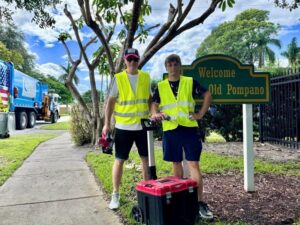
 Oval Office 4:05 P.M. EST PRESIDENT BIDEN: Mr. President, I’m honored to welcome back to the White House — welcome you back. It’s a great pleasure having you here. Both our nations’ strong democracies have been tested of late — very much tested — and our institutions are put in jeopardy. But both in the United States...
Oval Office 4:05 P.M. EST PRESIDENT BIDEN: Mr. President, I’m honored to welcome back to the White House — welcome you back. It’s a great pleasure having you here. Both our nations’ strong democracies have been tested of late — very much tested — and our institutions are put in jeopardy. But both in the United States...
Oval Office
4:05 P.M. EST
PRESIDENT BIDEN: Mr. President, I’m honored to welcome back to the White House — welcome you back. It’s a great pleasure having you here.
Both our nations’ strong democracies have been tested of late — very much tested — and our institutions are put in jeopardy. But both in the United States and Brazil, democracy prevailed.
When we spoke in January, I affirmed my commitment to our relationship. And when we spoke about our mutual agendas, they sound very similar.
I affirmed the United States’ unwavering support for Brazil’s democracy and respect for the free will of the Brazilian people.
We’re the two largest democracies in the hemisphere. Brazil, the United States stand together, we reject political violence, and we put great value in our democratic institutions.
And I believe, as we said at the time, together, that we have to continue to stand up for democracy — for democratic values that form the core of our strengths, not just in our hemisphere but around the world.
And the rule of law, freedom, and equality, these are the core principles we both believe in.
Our shared values and our strong ties between our people make Brazil and the United States, especially here in the big, global challenges, they put us on the same page, but particularly, especially climate — the climate crisis.
And thank you, Mr. President, for your commitment to advancing our partnership. This is an important moment for both our countries, in my view, and for the world, quite frankly.
And I’m looking forward to spending some time with you.
Thank you for being here.
PRESIDENT LULA: (As interpreted.) Well, Mr. President Biden, besides repositioning Brazil in a new world of geopolitics — because Brazil isolated itself for four years — I have three things to say to you, sir.
First of all, to thank you very much for your solidarity and for acknowledging my — when I was sworn into office.
Second, I want to acknowledge your posture in the defense of democracy.
And last but not the least, to congratulate you because of your speech in the State of the Union two days ago. It would fit very well if that speech was made in Brazil.
You know, Mr. President, that Brazil self-marginalized itself for four years. The former president didn’t enjoy to keep international relations with any country. His world started and ended with fake news — in the morning, afternoon, and at night. It seems that he despised international relations.
PRESIDENT BIDEN: Sounds familiar. (Laughter.)
PRESIDENT LULA: (As interpreted.) And Brazil is a country that has no (inaudible) — any litigation with any country in the world.
Brazil is a country that people enjoy peace, democracy, work, and Carnival, and samba, and a lot of joy.
This is the Brazil that we’re trying to reposition in the world.
The U.S. represents a lot of — has a lot of meaningful relations with Brazil. It’s an extraordinary relationship — political relationship, economic, and trade — a strong trade relationship, and very much so in the cultural relationship.
Now we have some problems, some issues that we have to work together.
First of all, never more allow that there should be a new chapter written again on the Capitol invasion here. And never more should happen what happened in Brazil, with the invasion of the National Congress, the President’s Palace, and the Supreme Court building.
The second thing that we can work together — we should work together — is to fight inequality, the racial issue. And I see that, once in a while, this is practiced — racism — in the U.S. and many other countries in the world, and in Brazil too, especially the youth — the Black youth that live in the periphery in Brazil. Many times, they are victims of the lack of government intervention and support of the state.
The violence that exists in the periphery, it’s the absence of the state government with public policies — so that we can guarantee some dreams for the youth.
The third issue is the climate change issue. We do have a commitment since 2009, in Copenhagen, when I participated in the COP15, and we took the pledge to reduce deforestation in Brazil in 80 percent, to diminish the greenhouse emissions effect in 39 percent. And we have fulfilled that promise during my term and during President Dilma’s term.
Well, in the last years, the rainforest in the Amazon was invaded by political lack of rationality — human irrationality — because we had a president that would send people to deforest. Gold-diggers — illegal gold-diggers entry Indigenous People’s reserves. Gold digging — illegal gold digging in Indigenous People’s reserves — reserves that exist in the rainforest, in the Amazon.
And I took a pledge that, until 2030, we will reach zero deforestation in the rainforest, in the Amazon. We will take all the endeavors to transform the Amazon, not a shrine for the humanity, but a center for research, shared with all the rest of the world so that we can benefit of the wealth and biodiversity that exists in the Amazon, so that we can transform this wealth in the improvement of the lives of the people that live in the Amazon rainforest.
So that is to say: To take care of the Amazon rainforest today is to take of the planet Earth. And to take care of the planet Earth is to take care of our own surviving. And that’s why, all of us, we have the obligation to leave to our sons and daughters and grandsons a better world than the one we received.
So a tree that is there for 300 years, no one owns that tree; no one can cut that tree. It’s an asset of the humanity. That tree is there to guarantee the survival and subsistence of the planet.
So that’s why we are going to take very seriously this policy.
Mr. President, I’d like to say one more thing. It’s necessary that we establish a new kind of conversation so that we can build a world governance that would be more stronger, because the climate change issue, if we don’t have a strong global governance that can make decisions and that all countries should abide to — if we don’t do that, it’s not going to work.
I don’t know what form this will happen. I don’t know if it’s at the U.N. or it’s at the G20 meetings or the G8 meetings, but something we have to try so that we can oblige the countries, our national domestic Congress, our business actors, that they should abide to the decisions that we make at global levels.
If this doesn’t happen, Mr. President, all our discussions on climate change will suffer great harm — damage. And I don’t think we have much time. It’s urgent. We need to take an attitude.
In Brazil, we’ll do whatever it’s possible to be done.
I can reassure you, Mr. President, that the U.S. and the rest of the world can count on Brazil in the fight for democracy and the fight for the preservation of the Amazon rainforest.
This is not a government program. This is a faith commitment of someone that believes in humanism, someone that believes in solidarity.
I don’t want to live in a world where humans become algorithms. I want to live in a world where human beings are human beings. And for that, we have to take care very carefully what God gave us: that is the planet Earth.
Thank you, Mr. President.
PRESIDENT BIDEN: Thank you.
4:19 P.M. EST
Official news published at https://www.whitehouse.gov/briefing-room/speeches-remarks/2023/02/10/remarks-by-president-biden-and-president-lula-da-silva-of-brazil-before-bilateral-meeting/
originally published at Politics - Social Gov


